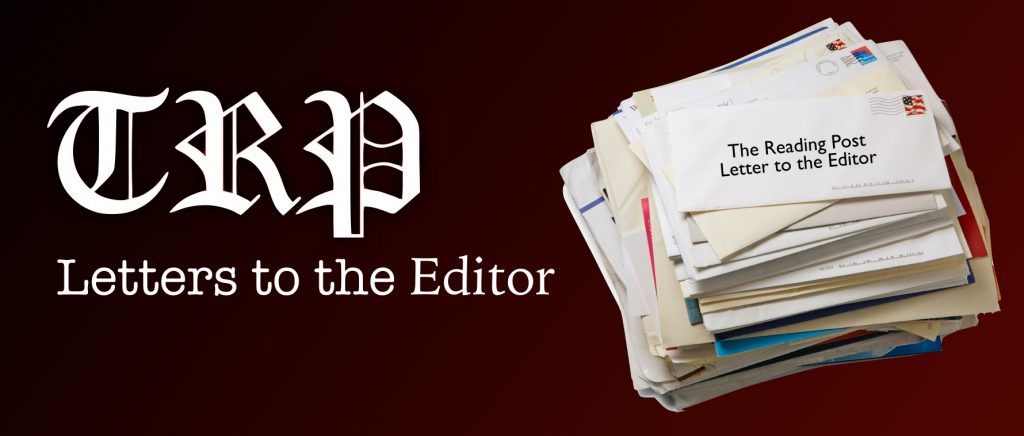 The Reading Post accepts Letters to the Editor. All letters must be signed. The Reading Post reserves the right to edit or not publish any letters received. Letters do not represent the views or opinions of the Post. editor@thereadingpost.com
The Reading Post accepts Letters to the Editor. All letters must be signed. The Reading Post reserves the right to edit or not publish any letters received. Letters do not represent the views or opinions of the Post. editor@thereadingpost.com
Dear Editor,
My name is Mark Dockser. My wife and I have lived in and loved our Reading community for the last 21 years. Our three children are proud graduates of the Reading public school system where they each thrived in different ways. I have been a town meeting member for 15+ years, and a member of the Finance Committee for the last 8 years, serving as chair for 3 years. I have also served on the Town and RMLD Audit Committees.
As an active member of FinComm, I have looked very carefully at the budgets and worked closely with school and town officials each year. I am closer to these numbers than most people would reasonably want to be. From my view, Reading is being run very efficiently and cost effectively (more on this later in this letter). Lack of sufficient revenue growth has required deep cuts over the last 5 years that have not just been down to the bone but unfortunately, they have cut into the bone. In my view and that of the town employees that run these departments, we are not currently able to fund our schools, public safety or other critical services at the necessary levels. These items are the “must haves” not the “nice to haves”, and they support both community values and housing values. If the “must haves” are not addressed now, I believe that these values will fade. The requested override is to restore services to where they should be based on the “must haves”. If we don’t pass this override, additional and steeper cuts will have to be made. This is why I STRONGLY SUPPORT THIS OVERRIDE.
Why do I feel so strongly about this? I have both observed and admired how well fiscally and operationally the schools and municipal government of Reading is run. In fact, many of the other cities and towns in Massachusetts (and beyond) hold Reading in high esteem for managing well under tight budgetary constraints; achieving the highest rating for our bonds, AAA, a rating that saves the town $100’s of thousands of dollars over the life of the projects; and for preparing our students well for the ever-changing world. Many municipalities have copied our leadership in programs based on their effectiveness and cost efficiency. From sharing part time resources with other towns, to obtaining grants for important projects like the Reading Coalition Against Substance Abuse, to providing our children with an excellent education even though our per pupil expenditure is one of the lowest in the state, to implementing an efficient, computerized facility maintenance system just to name a few. Though certainly not perfect, the town does a very good job in spending efficiently, effectively and responsibly.
Our tight fiscal control has served us well for the last 15 years since the last time Reading passed an Operational override supporting the core functions of the town. However, in the last 5 years we have been forced to cut teachers, reduce services and not staff public safety or our schools at the necessary levels. Costs that we cannot control, most notably health care and state mandated special education costs particularly for out of district transportation and tuition, are budget busters. Health care costs have been increasing 6-10% per year. The increase for the coming year’s budget for health, benefits and other out of our control costs (what we call accommodated costs) is 6%, and these accommodated costs represent 38% of our operating budget.
This is in the face of revenue growth of approximately 3% per year, and thus the need for cuts. Our revenues through property taxes can go up each year by 2.5% based on Prop 2 ½ (passed in 1980) plus new growth, which gets us to the 3% number. Reading is over 90% residential so our residents pay the vast majority of the taxes. Property taxes represent 72% of total revenues while other local revenues (like motor vehicle excise tax) represent another 8%. State Aid used to be a reliable source of funding for cities and towns, but it has not kept up with inflation or any other measure of costs. According to the Massachusetts Budget and Policy Center, State Aid in real terms (adjusted for inflation) is down 50% since 2001. It grows much less than 2.5% per year, and where it used to represent nearly 20% of our revenues…now it only represents 15%. For the coming year, the Governor’s budget would result in our state aid going up by only 1.25%.
As a community, we face an important decision on April 3. We can vote for the override to restore school services for the students of Reading, adequately staff police and fire, restore library funding and hours and increase support for Elder Services, Finance and DPW. If we do not support this, we will face even more service cuts—from the loss of foreign language programs and teachers in the middle school to insufficient staffing in emergency services, and more.
I encourage you to join me and VOTE YES ON APRIL 3.
Sincerely,
Mark Dockser
Beaver Road
Town Meeting Member, Precinct 1
Member, Reading Finance Committee
